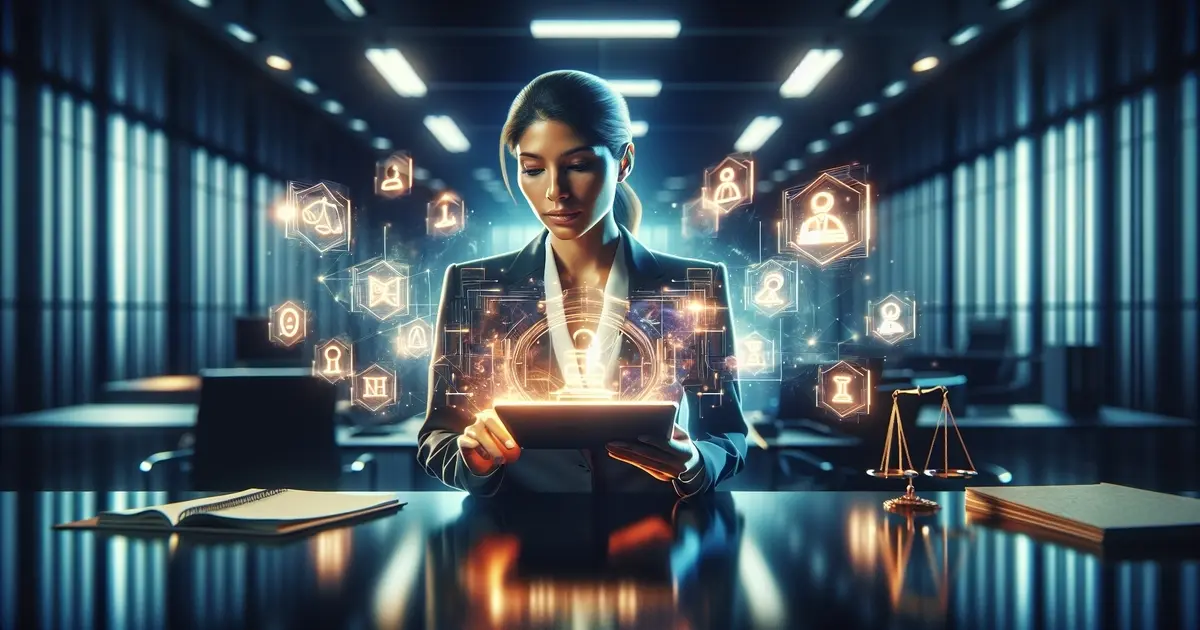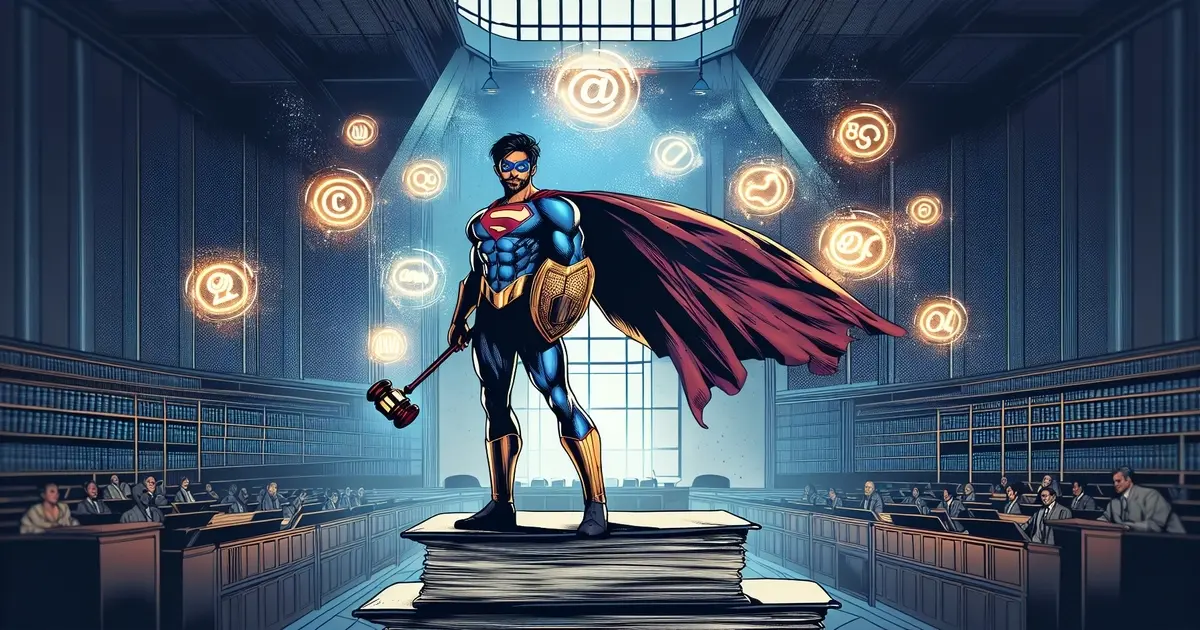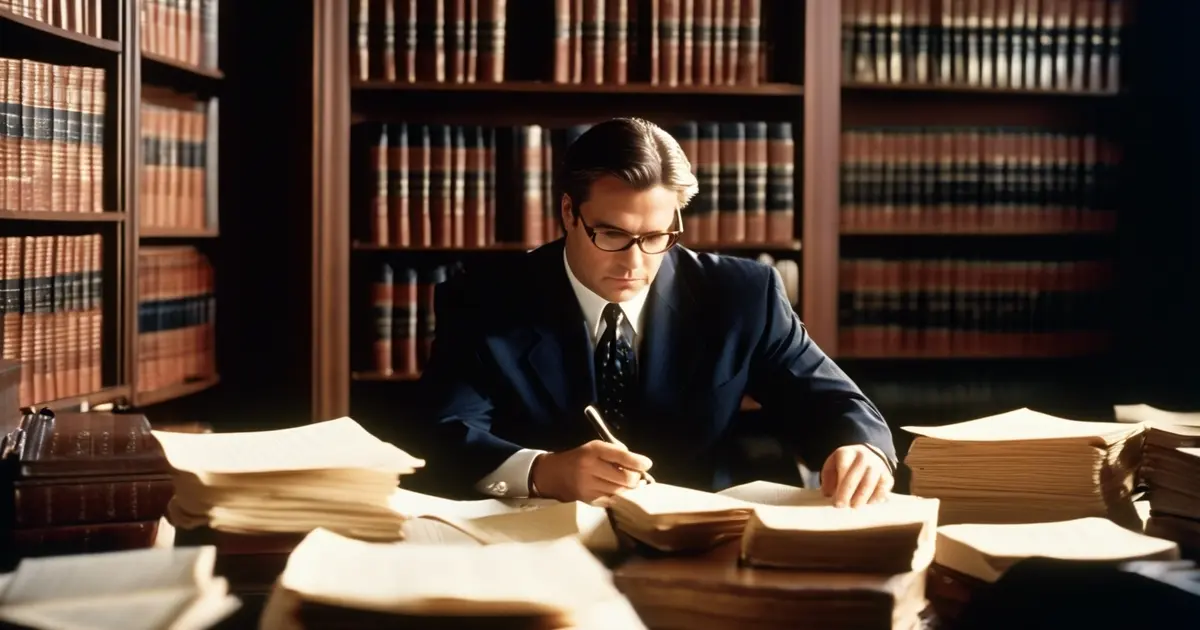IP Litigation Lawyer: Your Ultimate Guide
In the fast-paced world of innovation and creativity, protecting your intellectual property (IP) has never been more crucial. Enter the IP litigation lawyer, a specialized legal eagle who swoops in to defend your inventions, brand names, and artistic works from infringement and misuse. With the rise of digital technology and global commerce, the battles over IP rights, privacy, fair use, and security breaches have become more complex and high-stakes than ever before, with plaintiffs often at the center of disputes.
Whether a startup safeguarding its breakthrough product or an artist fighting for their original work, these lawyers are on the front lines. They ensure that the fruits of your intellect remain rightfully yours, navigate the complexities of fair use, and represent either the plaintiff or defendant. They blend a deep understanding of law and technology to navigate the intricate legal landscape, making them indispensable in today's creative economy.
Table Of Contents
Key Takeaways
- Historical Basis and International Protection: Intellectual property law, established by early statutes such as the Statute of Monopolies and the Statute of Anne, provides the foundational legal framework for protecting inventors and artists. Modern IP laws are further supported and standardized globally by international treaties like the WIPO Copyright Treaty and the Paris Convention, ensuring that creators can safeguard their inventions and artistic works across international borders.
- Roles and Skills of IP Litigation Lawyers: IP litigation lawyers are crucial in navigating the complexities of IP law. Their roles encompass various skills, including legal advocacy, document preparation, dispute resolution, and advisory services. They deeply understand legal texts, case precedents, and regulatory guidelines to offer comprehensive legal advice and robust defense strategies in court.
- Different Types of IP and Their Protection: Intellectual property includes distinct categories such as patents, trademarks, copyrights, and trade secrets, each with unique challenges. Understanding these differences is vital for adequate legal protection and enforcement, as each type requires specific legal strategies and handling.
- Litigation and Resolution Strategies: Depending on the negotiation and litigation strategies employed, IP disputes can be resolved through various outcomes, including settlements, injunctions, or monetary damages. IP litigation lawyers must employ persuasive argumentation and effective communication to protect their clients' interests during court proceedings, which include discovery, pre-trial motions, and trials.
- Career Path and Specialization in IP Law: To become an IP lawyer, one must undergo significant education and training, including obtaining a law degree and passing the bar exam. Specialization in particular aspects of IP law, such as patents in technology sectors or copyrights in digital media, can enhance a lawyer's expertise and open opportunities in high-profile cases and industries.
- Impact and Importance of IP Law on Business and Innovation: IP lawyers play a vital role in protecting innovation and creativity, which are crucial for business growth and competition. Effective IP legal strategies prevent financial loss and reputational damage and ensure that creative and inventive outputs are compensated, promoting further innovation and industry development.
Understanding Intellectual Property Law
IP Scope
Intellectual property (IP) law covers patents, trademarks, copyrights, and trade secrets. It also protects creations of the mind, including inventions, literary and artistic works, symbols, names, images, and designs used in commerce.
IP law ensures creators can profit from their inventions. It gives them exclusive rights to use their creations for a certain period. This motivates people to innovate and create new things.
Historical Roots
The concept of intellectual property originated in England during the 17th and 18th centuries. The Statute of Monopolies (1623) and the Statute of Anne (1710) were among the first laws to protect inventors and authors' rights.
These laws marked the beginning of modern intellectual property protection. They recognized that encouraging the creation of intellectual goods benefits society.
Modern Focus
Today's IP law balances rights to stimulate innovation. It seeks to protect creators while ensuring that advancements benefit the public.
Fair use is a critical aspect of this balance. It allows limited use of copyrighted material without permission under specific conditions, including uses for education or commentary.
Global Impact
IP law has a significant global impact. International treaties like the WIPO Copyright Treaty and the Paris Convention for the Protection of Industrial Property help standardize protections across countries.
These agreements ensure creators can protect their work worldwide. They provide opportunities for businesses to expand internationally while safeguarding their innovations.

Critical Roles of IP Litigation Lawyers
Legal Advocacy
IP litigation lawyers serve as vital advocates for their clients in disputes over intellectual property rights. They possess a deep understanding of IP law, enabling them to argue cases in court effectively. These trial lawyers conduct rigorous legal research to build compelling arguments that protect their client's innovations or creative works.
They are skilled at navigating the complexities of the courtroom, presenting evidence, and cross-examining witnesses to ensure their client's rights are upheld. Their advocacy extends beyond the courtroom as they negotiate settlements that favor their clients, avoiding lengthy trials when possible.
Document Preparation
Preparing legal documents is a critical role for IP litigation lawyers. They draft and file the necessary paperwork for patents or trademarks with precision. This process involves thoroughly analyzing the invention or creation to ensure it meets all legal requirements for protection under IP law.
They liaise with patent and trademark offices, promptly responding to objections or inquiries. This meticulous attention to detail ensures their client's intellectual property is correctly registered, offering legal protection against infringement.
Dispute Resolution
IP litigation lawyers are crucial in offensive and defensive intellectual property disputes. On the offensive side, they identify instances where a client's IP rights have been infringed upon and take appropriate legal action. This might involve sending cease-and-desist letters or filing lawsuits to stop the infringement and seek damages.
Defensively, they represent clients accused of infringing on someone else's intellectual property rights. They develop strategies to prove that their client's work is original or falls under fair use, thereby avoiding penalties.
Navigating IP Lawyer Responsibilities
Advisory Role
IP litigation lawyers play a crucial role in guiding their clients through the complex landscape of intellectual property rights. They help individuals and businesses understand what is at stake and outline their legal options, including explaining patent laws, copyright rules, and trademark regulations.
They help clients grasp the implications of their intellectual property decisions. This guidance is vital for making informed choices about protecting or enforcing IP rights.
Legal Research
A significant part of an IP lawyer's job involves deep diving into legal texts. They scrutinize laws, previous case rulings, and regulatory guidelines to offer the best advice. Their research ensures that counsel provided to clients rests on solid legal ground.
This background work is often unseen by clients but is foundational to crafting winning strategies in IP litigation. It requires a keen eye for detail and an unwavering commitment to understanding every nuance of IP law.
Interpretation Skills
Interpreting complex legal jargon into understandable advice is another critical responsibility. IP lawyers must translate dense legalese into actionable insights for their clients.
Their ability to do this effectively can mean the difference between a client feeling confused or confident about their next steps. It also ensures that clients are fully aware of their rights and the potential outcomes of their cases.
Communication Excellence
Effective communication is paramount for IP litigation lawyers. They must maintain clear, open lines with clients, other legal professionals, and patent/trademark offices.
Good communication helps build client trust and facilitates smoother interactions with court personnel and opposing counsel. It also aids in presenting cases more persuasively before judges or during negotiations.
Essential Skills for IP Litigators
Analytical Proficiency
IP litigators must possess strong analytical skills. They navigate complex intellectual property laws and case precedents, making sense of intricate legal details. This skill is crucial for identifying a case's strengths and weaknesses.
They analyze vast amounts of information to develop winning strategies. Their ability to dissect and understand complex legal documents significantly affects their success.
Research Capability
Another vital skill is in-depth research capability. IP litigators spend considerable time investigating relevant laws, previous cases, and patent databases.
This thorough research ensures they are well-prepared to argue their case effectively. It also aids in crafting detailed legal documents that can withstand scrutiny.
Persuasive Communication
Effective communication is critical for IP litigators. They must excel in both persuasive writing and oral advocacy.
Writing skills are essential for drafting compelling legal documents, motions, and briefs. Oral advocacy skills come into play during court proceedings, where presenting arguments clearly and persuasively can sway decisions.
Tech Savviness
Staying updated on evolving IP laws and technology trends is non-negotiable. IP litigators must be tech-savvy and understand how innovations impact intellectual property rights.
Their career demands constant learning to provide relevant advice on cutting-edge technologies. This knowledge helps them anticipate legal challenges before they arise.
Adaptability
The field of intellectual property law is ever-changing. Thus, adaptability is a critical skill for IP litigators.
They must quickly adjust strategies based on new laws or technological advancements. Flexibility allows them to remain effective client advocates in a dynamic legal landscape.
Intellectual Property Dispute Types
Infringement cases are critical issues. They happen when someone uses protected work without permission. These can involve patents, trademarks, copyrights, and trade secrets, each with unique challenges.
Patents are about the unauthorized use of an invention. Companies often find themselves in legal battles over technology rights. Trademarks deal with brand identity issues. When a similar mark confuses customers, it's infringement. Copyrights protect creative works like books and music from being copied without consent. Trade secrets involve sensitive business information getting out.
Misappropriation Concerns
Misappropriation is another common dispute type. It mainly involves trade secrets. This occurs when someone improperly acquires or discloses confidential information.
Businesses must vigorously safeguard their trade secrets. A loss can be devastating. Legal actions focus on proving the misappropriation and stopping further damage.
Licensing Disagreements
Licensing agreements allow others to use intellectual property legally. Disputes arise when parties disagree on terms or violate them.
These disagreements can lead to complex litigation. They often involve contract law alongside IP law principles.
Patent vs Trademark
Understanding the difference between patent and trademark disputes is crucial for businesses. Patents protect inventions or processes for a limited time. Trademark disputes revolve around brand names or logos, confusing the market.
Both require strategic legal action to defend rights effectively.
Copyright vs. Trade Secret
Copyright disputes usually involve unauthorized reproduction of protected works. Trade secret cases focus on protecting confidential business information from theft or exposure.
Each requires a tailored approach to safeguard interests and enforce rights.
Potential Outcomes
IP disputes can end in various ways, including settlements, injunctions, or monetary damages.
Settlements offer a way to resolve conflicts without lengthy trials. Injunctions can stop further infringement or misuse of IP rights immediately. Monetary damages compensate for losses suffered due to the dispute.
Effective resolution depends on skilled negotiation and litigation strategies.
Path to Becoming an IP Lawyer
Education Journey
The first step in becoming an intellectual property (IP) lawyer is completing a bachelor's degree. This is followed by attending law school, where the focus shifts towards understanding the broader legal system. Here, students must excel in their studies, particularly in courses related to intellectual property law. These specialized courses are crucial as they lay the foundation for a career in IP litigation.
Law schools often offer subjects covering various aspects of intellectual property law, from copyright and patent laws to trademarks and trade secrets. Excelling in these subjects provides essential knowledge and sets the stage for future specialization.
Gaining Experience
Gaining practical experience becomes paramount after law school. Internships or clerkships within firms or organizations specializing in IP law offer invaluable hands-on experience. They allow aspiring lawyers to apply their theoretical knowledge in real-world settings, dealing with actual cases of intellectual property disputes.
These opportunities often involve working closely with experienced IP lawyers, offering insights into the intricacies of IP litigation and dispute resolution. They also help build professional networks that can benefit one's career.
Licensing and Certification
Passing the bar exam is critical for aspiring lawyers, including those specializing in IP law. This rigorous examination tests a candidate's understanding of general legal principles and specific knowledge related to their area of specialization.
Obtaining additional certifications can be advantageous for those aiming further to distinguish themselves in intellectual property law. Various legal associations offer certifications that recognize expertise in IP law aspects. These certifications not only enhance one's credentials but also signal a commitment to maintaining high standards in the practice of IP law.

Intellectual Property Litigation Explained
Pre-Filing Phase
Before any legal action begins, IP litigation lawyers conduct thorough investigations. They assess the validity of the claim and gather necessary evidence. This stage is crucial for understanding the case's strengths and weaknesses.
Clients receive guidance on their rights and potential risks. Lawyers also explore if a settlement can be reached before going to court. This phase sets the foundation for a strong case or a strategic settlement.
Court Proceedings
Once a lawsuit is filed, it moves through various stages in state courts or sometimes federal courts, depending on the nature of the intellectual property. The process includes discovery, where both parties exchange information, and pre-trial motions, which aim to narrow down the issues.
Trials are complex and demand detailed preparation. IP litigation lawyers present evidence, cross-examine witnesses, and argue legal points to protect their client's interests. Whether representing the plaintiff or defendant, they strive for a favorable outcome.
Appeals Process
Not all decisions end with the trial. Parties can appeal to higher courts if they believe the law was misapplied. IP litigation lawyers focus on legal arguments rather than new evidence during appeals.
This stage requires deep knowledge of appellate law and persuasive argumentation skills. Successful appeals can overturn previous rulings or result in new trials.
Strategies Employed
IP litigation lawyers use various strategies to defend their clients' intellectual property rights. Negotiation and mediation are often preferred for their cost-effectiveness and speedier resolutions than trials.
Litigation becomes necessary when disputes cannot be resolved amicably. Lawyers meticulously prepare their cases, knowing that outcomes impact their client's financial health and reputation.
Impacts on Businesses
Intellectual property litigation can have significant consequences for businesses. Financially, it involves legal fees, potential damages payments, or revenue loss if assets are compromised.
Reputationally, lawsuits may affect customer trust and market position. For individuals like inventors or artists, these disputes can determine their ability to profit from their creations.
Businesses may face security breach issues if sensitive data is involved in a case. Protecting client privacy becomes paramount during such times.
Organizations like colleges may also get entangled in IP disputes over research findings or software developed within academic settings.
Benefits of an IP Law Career
Diverse Opportunities
IP law offers vast opportunities across various sectors. Lawyers can work in law firms, corporations, or government agencies. Each setting provides unique experiences and challenges.
Attorneys in law firms often handle a wide range of cases, from trademark disputes to patent infringements. They collaborate with clients from diverse industries, offering broad exposure to intellectual property issues.
Corporations also hire IP lawyers to protect their innovations and manage intellectual property portfolios. These roles are crucial for companies in technology, pharmaceuticals, and entertainment sectors where innovation is critical.
Government agencies, such as the U.S. Patent and Trademark Office (USPTO), employ attorneys to review patent applications and make legal decisions on intellectual property rights. This role allows lawyers to contribute directly to regulating and protecting innovative ideas.
Intellectual Satisfaction
Protecting creativity and innovation brings deep intellectual satisfaction. IP lawyers play a pivotal role in safeguarding the fruits of human ingenuity.
They face complex legal puzzles that require creative thinking and a deep understanding of law and technology. Solving these puzzles not only protects clients' assets but also contributes to the advancement of various industries by ensuring that innovations remain protected and profitable.
The nature of IP law means attorneys must stay abreast of technological advancements and evolving legal landscapes. This continuous learning process is challenging and rewarding, providing endless intellectual stimulation.
Career Growth
IP law offers significant potential for career growth and specialization. Attorneys can become experts in specific areas, such as patents, copyrights, trademarks, or trade secrets. Specialization allows lawyers to differentiate themselves in the market and become sought-after experts in their field.
Career progression might include becoming a partner at a law firm, leading an in-house legal team at a corporation, or taking on influential roles within government agencies. The demand for skilled IP lawyers ensures that career opportunities continue to expand as new technologies emerge and the global marketplace grows more interconnected.
Specializing in digital media, biotechnology, or software patents can open doors to high-profile cases and clients, further enhancing career prospects.
Summary
IP litigation lawyers stand at the forefront of protecting innovation and creativity. They navigate complex legal landscapes to defend intellectual property rights, ensuring that inventors and creators can reap the rewards of their ingenuity. With roles ranging from dispute resolution to advising on IP strategy, these legal professionals play a crucial part in fostering an environment where new ideas can flourish without fear of infringement. The journey to becoming an IP lawyer is demanding. Still, it offers the unique opportunity to engage with cutting-edge technologies and artistic works while making a tangible impact on the future of industries and culture.
What is your next step? Consider whether a career in IP law aligns with your passion for innovation and justice. Dive deeper into this field, seek educational resources, or connect with practicing IP litigation lawyers to learn more about this dynamic career path. The world of intellectual property law awaits your contribution.
Frequently Asked Questions
Related Post
Private Equity Lawyer
Have they ever wondered how businesses pull off massive growth spurts seemingly overnight through venture capitalism, leveraging mergers, and other corporate matters?
Read MoreVenture Capital Lawyer
Have you ever wondered how startups transform into tech giants? Venture capital lawyers are behind every successful leap for early-stage companies, the unsung heroes navigating the complex world of business investments, opportunities, and legal challenges.
Read MoreRegulatory Compliance Lawyer
Nearly 90% of businesses report that compliance with regulations, including regulatory issues and legal obligations enforced by regulatory agencies, is one of their top challenges.
Read MoreSecurities Lawyer
Navigating the complex world of investments, mutual funds, stock exchanges, and financial regulations can be daunting without the right expertise from experienced securities lawyers and advisors.
Read MoreCorporate Governance Lawyer
Navigating the complex world of corporate governance, including advisory firms and board committees, requires more than just savvy business acumen; it demands specialized legal expertise in law and fiduciary duties.
Read MoreMergers and Acquisitions (M&A) Lawyer
Navigating the complex world of mergers and acquisitions, which may involve buyer interests and customer contracts, among other things, requires a specialized guide, specifically, an M&A lawyer.
Read More






